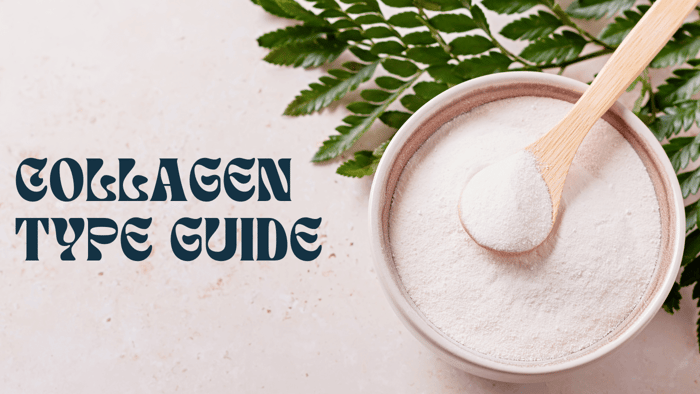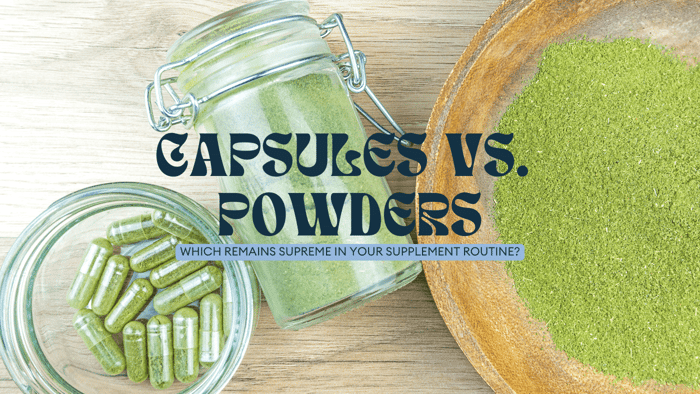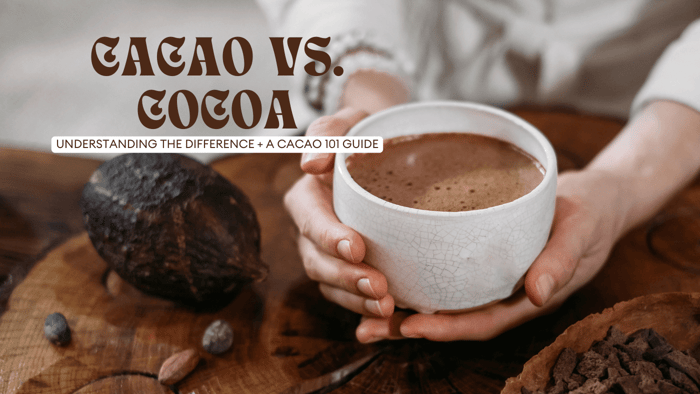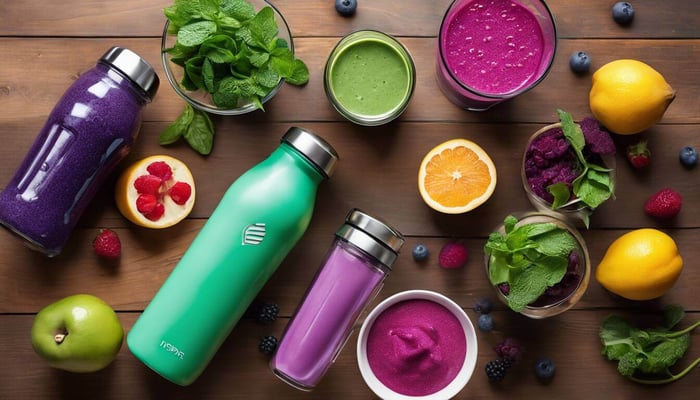The Ultimate Guide to Collagen: Types, Benefits, and Easy Mixing
Collagen has quickly become a mainstay in the wellness world. From boosting the appearance of skin and hair to supporting joint function, this structural protein is lauded for its wide-ranging benefits. But did you know that collagen type matters, with several different forms offering distinct advantages? Or that collagen can come from multiple sources—marine, bovine, or chicken? Understanding these nuances can help you choose the right product to fit your specific needs.
1. What Is Collagen and Why Does It Matter?
Collagen is the most abundant protein in the human body, constituting around 30% of our body’s total protein content. It acts like a supportive “glue,” providing structure and elasticity in places like:
- Skin: Helps maintain firmness and elasticity
- Bones: Contributes to bone density and strength
- Tendons and Ligaments: Assists in flexibility and shock absorption
- Cartilage: Cushions joints, reducing friction
- Blood Vessels: Helps maintain the integrity of arteries and veins
Over time, collagen production naturally declines—especially as we age. This drop can contribute to wrinkles, stiffer joints, and more fragile hair and nails. For this reason, collagen supplements have risen in popularity. The idea is that by providing your body with collagen peptides (partially broken-down collagen), you can support your body’s own collagen synthesis and potentially slow or offset some age-related changes.
It’s important to note that collagen isn’t a magic cure-all. Lifestyle factors—like a balanced diet, adequate protein intake, sun protection, and healthy exercise—also play a big role in preserving your collagen structures. However, many people discover that adding a targeted collagen supplement can be a helpful piece of the puzzle for maintaining a youthful, resilient body.
2. Different Types of Collagen: A Closer Look
While the body contains at least 28 known types of collagen, just a handful are commonly discussed in supplements and skin-care routines. Each form plays a distinct biological role in supporting specific tissues. Let’s break down the types you’re most likely to encounter:
Type I Collagen
- Where It’s Found: Skin, bone, tendons, and ligaments
- Why It’s Popular: Type I is the most abundant form in the body. It’s closely linked to skin elasticity and healthy hair and nails, making it a go-to option for beauty-related goals.
- Supplement Sources: Often derived from marine or bovine origins. Marine type I collagen is a favorite for those who avoid mammalian products or have dairy concerns.
Type II Collagen
- Where It’s Found: Cartilage (particularly in joints)
- Why It’s Popular: Type II is essential for supporting joint health. It’s integral to cartilage repair and flexibility, which is especially important for individuals with arthritis or athletes subjected to repetitive impact.
- Supplement Sources: Frequently sourced from chicken sternal cartilage or other avian origins.
Type III Collagen
- Where It’s Found: Skin, blood vessels, and internal organs
- Why It’s Popular: Often works in tandem with Type I. This duo is typically present in multi-collagen blends and is noted for benefits in skin health, elasticity, and circulation.
- Supplement Sources: Commonly found alongside type I in bovine-sourced products, as well as in some fish-based formulas.
Less Common (But Still Notable) Types
- Type V: Plays a role in cell membranes, hair, and fetal development. May appear in certain multi-source collagen supplements.
- Type X: Implicated in bone formation and cartilage. Occasionally found in advanced “complete collagen” blends.
3. Common Sources of Collagen
When you’re looking at collagen products, the source of the protein can significantly influence the types of collagen present, flavor, digestibility, and even ethical or dietary concerns.
Bovine (Cow)
- Types Present: Primarily type I and III, both crucial for skin, hair, nails, and connective tissue.
- Who Might Prefer It: People looking to support overall beauty or body wellness, and those without issues consuming beef-derived products.
- Considerations: If you’re specifically concerned about joint function, you may need to add type II from another source. Also, verify the product’s quality and certifications (e.g., grass-fed, pasture-raised).
Marine (Fish)
- Types Present: Typically type I (and occasionally other variants in smaller amounts).
- Who Might Prefer It: Individuals who avoid beef or pork, those seeking a potentially more bioavailable type I collagen.
- Considerations: Marine collagen can be more expensive, and it’s not ideal for those with fish or shellfish allergies.
Chicken
- Types Present: Often type II, making it popular for joint support and cartilage repair.
- Who Might Prefer It: Athletes, older adults with arthritic issues, or anyone focusing on knee, shoulder, or other joint health.
- Considerations: Not suitable for vegetarians or vegans, obviously, and not a top choice if you primarily want hair/skin benefits from type I and III.
Multi-Collagen Blends
- Types Present: Commonly a mix of type I, II, III, V, and X from multiple animal sources (often beef, chicken, and fish).
- Who Might Prefer It: People wanting a broader approach, including skin, hair, nails, and joints.
- Considerations: Blends can be pricier, and if you have dietary restrictions (e.g., kosher, pescatarian), check for source specifics.
4. Collagen Benefits and Claims
While research is ongoing, many users and some studies suggest beneficial effects from supplementing with collagen:
- Skin Elasticity and Hydration
Regular intake might help reduce fine lines and dryness. Type I and III are especially relevant here. - Joint Comfort
For athletes and older adults, type II collagen is frequently linked to improved joint function and reduced soreness. - Hair and Nail Strength
By supporting keratin synthesis, collagen can potentially reduce brittleness and breakage. - Gut Health
Collagen contains amino acids like glycine and glutamine that may support the gut lining, though more research is needed to confirm direct benefits. - Bone Density
Since bones are partially collagenous, some evidence suggests supplementation might contribute to bone mineral density in aging populations.
Still, keep in mind that the body breaks down dietary collagen into amino acids, which it then repurposes as needed. Individual results can vary, and consistency is key—most people notice changes after a few weeks to a couple of months.
5. How to Incorporate Collagen into Your Daily Routine
One of the perks of collagen powder is its versatility. It’s typically neutral in taste, especially if the product is well-processed. Here are some ways to integrate it seamlessly:
- Morning Coffee or Tea
Dissolve a scoop right into your hot beverage. Many powders are nearly flavorless, so you won’t drastically change the taste, especially if you add milk or sweetener. - Smoothies and Protein Shakes
Blend collagen powder with fruits, vegetables, and maybe a splash of nut milk. This can be a post-workout treat or a quick breakfast. - Baking and Cooking
Add a scoop to pancake batter, muffins, or soups. Higher temperatures can degrade some amino acids, but you’ll still gain some nutritional benefit. - Collagen Gummies or Bars
If you’re culinary-inclined, experiment with homemade gummy treats or protein bars by mixing collagen powder into the recipe. - Water Infusions
Some prefer simply stirring collagen into cold water or juice. However, be mindful that it might take extra shaking or stirring to fully dissolve (unless you have the perfect blending tool—more on that soon).
6. The Scoop on Dosage
Experts generally recommend 2.5 to 15 grams of collagen per day, depending on the intended effect and the product’s concentration. Some studies show benefits at as little as 2.5 grams daily, though for joint health, you might see suggestions around 10 grams. Always follow the serving size on the label, and consider consulting a healthcare professional if you have specific health conditions or concerns.
7. Potential Side Effects and Precautions
Collagen is widely considered safe and well-tolerated for most people. However:
- Allergies: If you’re allergic to fish or shellfish, be cautious with marine collagen.
- Digestive Sensitivity: A small number of people might experience bloating or mild gastrointestinal upset.
- Dietary Restrictions: Collagen is animal-derived, so it’s not vegetarian- or vegan-friendly. If that’s a concern, look into plant-based protein alternatives (though they aren’t technically collagen).
As always, if you’re pregnant, nursing, or on certain medications, check with a doctor before diving into any new supplement routine.
8. Why the Elixir Mixer Is Perfect for Collagen Drinks
If you’ve ever tried stirring collagen powder into a beverage with a spoon, you might have encountered lumps or undissolved particles at the bottom of your cup. That’s where the Elixir Mixer excels.
A) Quick, Clump-Free Blending
The Elixir Mixer’s efficient swirling mechanism breaks down powder granules in seconds, yielding a creamy, smooth consistency—whether you’re mixing into hot coffee or a chilly fruit smoothie.
B) Multi-Liquid Compatibility
It doesn’t matter if you’re using water, almond milk, juice, or a protein shake base. The Elixir Mixer can handle them all, ensuring an even distribution of collagen.
C) Portable and Convenient
You can often find compact models that are battery-operated or chargeable, perfect for taking to the office, gym, or while traveling. Collagen is most effective when used consistently, and easy blending on the go helps you stick to the routine.
D) Less Cleanup
Because the Elixir Mixer’s swirl does the heavy lifting, you avoid leftover residue stuck to the sides of a standard shaker cup. A quick rinse and you’re done—no fuss, no flakes of undissolved powder.
E) Enhanced Ritual
For many, daily supplementation isn’t just about nutrients—it’s also about creating a self-care moment. Watching the vortex swirl can be a mini “mindful break,” transforming an otherwise mundane task into a pleasant morning or afternoon ritual.
9. Extra Tips for Selecting a High-Quality Collagen
- Sourcing Transparency
Look for brands that detail how and where they source their collagen—grass-fed bovine, wild-caught fish, etc. - Third-Party Testing
Reputable labels often subject their products to independent testing for purity and potency. - No Unnecessary Fillers
Ideally, your collagen supplement will have minimal or zero additives (unless you specifically want flavors, sweeteners, or vitamin enhancements). - Amino Acid Profile
Some companies list the amino acid composition. If you’re aiming for a particular ratio (glycine for gut health, for instance), these details can help you choose the right product. - Avoid Overblown Claims
Be wary of any product that overpromises “miraculous” transformations. Collagen can be supportive, but it’s not a magic bullet.
10. Sample Collagen Recipes to Try
Ready to get creative with your daily scoop? Here are a few ideas, each easily perfected with an Elixir Mixer:
Creamy Collagen Coffee
- 1 cup hot coffee
- 1 scoop of your preferred collagen (type I or type I & III)
- 1 tablespoon coconut oil or MCT oil (optional)
- A dash of cinnamon
- Method: Use the Elixir Mixer to blend for a frothy, latte-like finish.
Tropical Smoothie Boost
- 1 cup coconut water or pineapple juice
- 1 scoop multi-collagen blend
- 1/2 teaspoon mango powder
- 1/2 mashed banana
- Method: Add ingredients to your Elixir Mixer, then use the Elixir Mixer for a smooth, summery treat.
Overnight Oats with Collagen
- 1/2 cup rolled oats
- 1 scoop collagen powder
- 1 cup milk (dairy or plant-based)
- 1 teaspoon chia seeds (optional)
- Method: Stir the collagen into the milk using the Elixir Mixer, then pour over oats in a sealed container. Refrigerate overnight. Stir again briefly in the morning before digging in.
Collagen Hot Cocoa
- 1 cup warm milk (or unsweetened almond milk)
- 1 tablespoon cocoa powder
- 1 scoop collagen (type I & III recommended)
- Sweetener to taste (like maple syrup or stevia)
- Method: Blend with the Elixir Mixer until no lumps remain, then indulge in a cozy, chocolatey moment.
11. Potential Combinations and Stacking
Some people “stack” collagen with complementary supplements. For example:
- Vitamin C: This vitamin helps stimulate the body’s own collagen production. Pair your collagen intake with a vitamin-C-rich fruit or a separate supplement.
- Hyaluronic Acid: Known for supporting skin hydration. Sometimes added to collagen formulas for a synergistic effect.
- MSM (Methylsulfonylmethane): May bolster joint health, used alongside type II collagen for extra cartilage support.
Just remember to introduce one new supplement at a time, monitoring how your body responds. If you’re mixing multiple ingredients, the Elixir Mixer ensures each is evenly distributed.
12. Frequently Asked Questions
Q: Can I take multiple types of collagen simultaneously?
A: Absolutely. Many multi-collagen blends exist for that reason. Alternatively, you can rotate or stack different single-source products based on your goals (e.g., type II for joint support in the morning, type I for skin at night).
Q: How long before I see results?
A: Individual experiences vary. Some notice improvements in skin hydration or hair strength within 4–8 weeks. Joint-related effects might take a bit longer. Consistency is key.
Q: Is collagen safe for pregnant or breastfeeding mothers?
A: In general, collagen is a protein supplement. However, pregnant or nursing women should consult their healthcare provider before adding any new supplement to ensure it aligns with their specific needs.
Q: Will collagen break my fast if I’m intermittent fasting?
A: Collagen contains calories (from protein), so it technically breaks a fast. That said, some people opt for “modified fasting” protocols that allow a small number of calories, including from collagen.
13. Conclusion
Collagen may be just one piece of the holistic wellness puzzle, but it’s an undeniably versatile player. From hair and skin to joints and bones, the benefits of collagen supplementation can be broad, especially when choosing a type (or blend of types) that targets your specific objectives. Bovine-based products often suit those seeking improved skin or hair health, while chicken-sourced collagen supports joint cartilage. Marine options can be an excellent fit for pescatarians or those aiming for higher bioavailability in type I.
Regardless of which variety you select, consistency and easy preparation are crucial. That’s where the Elixir Mixer makes all the difference—ensuring your collagen powders fully dissolve into your drink of choice, free of clumps or unpleasant textures. A quick swirl, a push of a button, and you’re on your way to sipping a well-mixed, velvety beverage. In today’s busy lifestyles, any tool that simplifies self-care is a win.
Remember, collagen isn’t a magic wand. Pair your new supplement habit with a balanced diet, sufficient protein intake from whole foods, regular exercise, and quality sleep. That’s the real recipe for feeling (and looking) your best over the long term. If you’re curious about other healthy-living hacks, check out additional blog posts or speak with a nutrition professional.
Here’s to smoother mornings, stronger joints, and a daily collagen ritual that’s as satisfying as it is nourishing—made all the more effortless with the help of a swirling, fuss-free Elixir Mixer.
Disclaimer: This post is for informational purposes only. Always consult a licensed healthcare provider for personalized medical or dietary advice—especially if you have underlying conditions, are pregnant or nursing, or take prescription medications.








